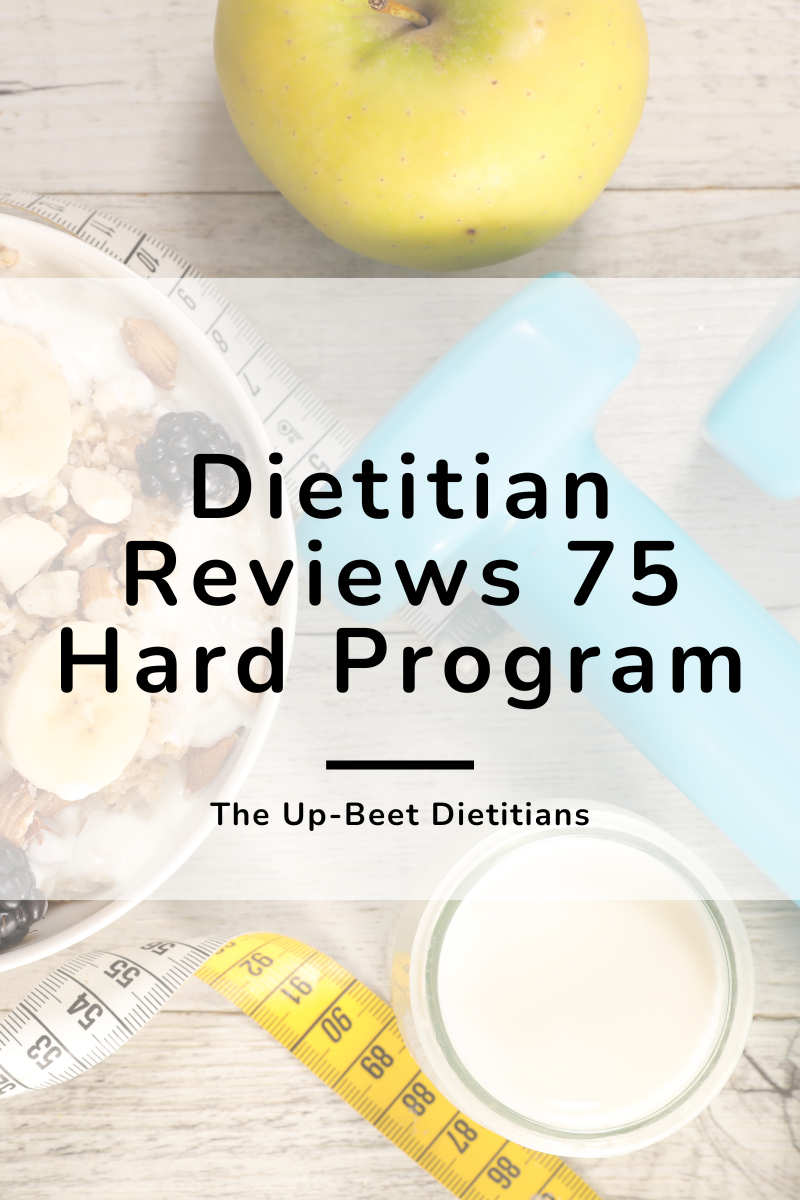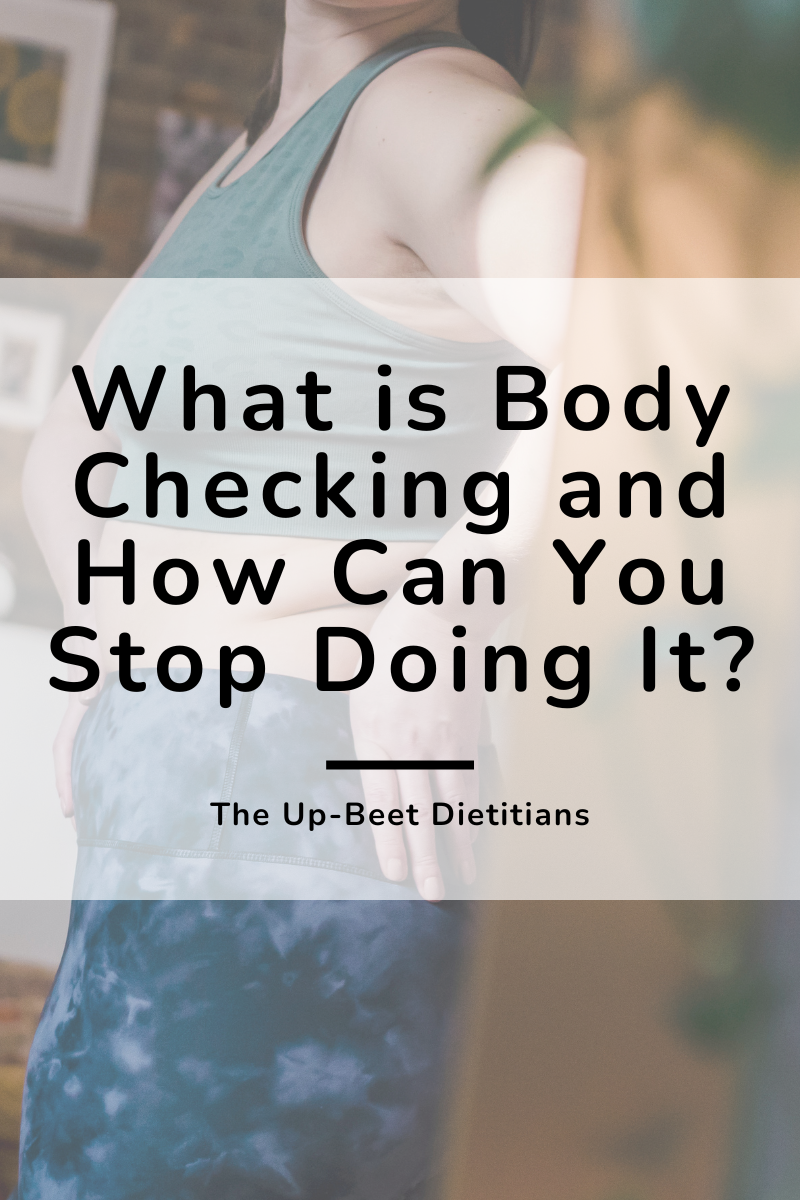Dietitian Reviews the 75 Hard Program
Written by: Hannah Thompson, RDN, LD, CPT
Challenges are a very popular method of self-improvement, as seen frequently on social media. One current trending challenge is one called 75 Hard. The 75 Hard program includes nutrition, fitness, hydration, and even reading goals to help transform your “mental toughness”.
In this post, I am going to share my thoughts as a non-diet registered dietitian to help you decide if 75 Hard is a program that you should try.
What is 75 Hard?
75 Hard is a “transformative mental toughness” program created by author, podcaster, and YouTuber Andy Frisella. Andy Frisella is the CEO of 1st Phorm, a popular supplement company.
75 Hard includes five strict rules that you must follow for 75 days. If you don’t follow one of the rules, you must start the challenge over. The five rules are:
Choose a diet and follow it.
Complete two 45-minute workouts daily. One of the workouts must be outside.
Drink a gallon of water every day.
Read 10 pages of nonfiction. Audiobooks don’t count and the book must be in the genre of personal development or education.
Take progress pictures.
Potential benefits of doing 75 Hard
At the surface level, it looks like 75 Hard could offer some benefit. I am not going to argue that reading, hydration, and exercise aren’t generally health-promoting behaviors - they are! The program also promotes goal setting and the structure could prove to be very motivating for some.
Issues with 75 Hard
I’m afraid that even with the touted benefits, 75 Hard may do more harm than good for many people.
Many extreme changes all at once
For many, this program involves making far too many lifestyle changes at one time. For example, if you are currently sedentary, trying to do two 45 minute workouts/day is quite a leap.
This rule also does not regard access to time - many people can hardly fit in one workout each day. If an individual works at their job for 8 hours per day and spends their mornings and evenings with their children (not to mention other tasks like cooking and cleaning), this leaves little time for 90 minutes of exercise. Plus, this recommendation of 90 minutes of daily exercise is not an evidence-based recommendation.
Setting more individualized goals would likely be more appropriate and lead to greater success in maintaining the behavior changes.
The diet is up for interpretation
The 75 Hard program involves choosing a diet and sticking to it. This can be any diet as long as there are not any cheat days or alcohol. This vague rule may lead many to choose a restrictive, unsustainable diet. I mean, they want the best results possible in these short 75 days, right?
There is a large body of evidence showing that diets don’t work, especially very restrictive ones. In fact, most diets result in weight gain, which tends to be the opposite of what the diets promise. Weight gain is not inherently unhealthy (more on that here), but it is likely not what individuals are hoping for when participating in the 75 Hard challenge. This can prove to feel very defeating and make you feel like you did something “wrong”, when in reality the restrictive diet was not a good fit in the first place and your body was just trying to protect you from a self-induced famine.
It’s also important to note the importance of adequate nutrition when completing two workouts each day. Many diets involve cutting carbs and overall calories, both of which our bodies need as fuel for exercise. Inadequate nutrition paired with daily workouts can lead to fatigue, injuries, poor recovery, irritability, and poor sleep. Speaking of which, the rules do not mention anything about recovery after two 45-minute workouts. Rest and recovery are a very important piece of full-body health.
A gallon of water may be too much
The theme continues - this program is far from individualized. The general rule of drinking a gallon of water each day is a popular one. For some, this may be an appropriate amount of water, especially for those who sweat a lot during the workouts or perhaps during their jobs. But for others, this could be too much and lead to overhydration (yup, that’s a thing). The risk of overhydration is especially prevalent if the diet of choice involves too few electrolytes and minerals.
Progress photos are unnecessary
If this challenge is about mental toughness, then physical changes should be irrelevant. However, all testimonials on the website include progress photos…even though “this is not a fitness program”.
This is your reminder that progress photos are not a good indicator of a program’s success or how well it “works”. You can not assume someone’s health by what their body looks like. Fitness, “mental toughness”, and overall health do not have a look. Not to mention that photos can (and often are) altered. Who can even confirm if the “after” photo is an accurate depiction of the person’s body?
If someone lost weight (according to the “after” photo in the testimonial), this does not automatically mean that their health improved. What if they have developed a disordered relationship with food? What if they are not eating enough? What if they are over exercising and not recovering well? What if their mental health has suffered? Weight loss (or the evidence of it in a photo) does not directly correlate with heath.
Lack of flexibility
“Flexible” is not a word that I would use to describe this program. In fact, it is quite the opposite. You are instructed to start from scratch if you don’t follow the five rules every single day, even if you break a rule on day 74. But as you probably already know, life is unpredictable. You could very well come down with an illness during these 75 days (which is actually more than likely if you are not allowing your body to rest). Family emergencies happen as well as daily ups and downs that could impact your ability to follow the five rules as strictly as the program requires.
This emphasis on perfectionism could prove to be very unhealthy for some. Mental health could absolutely suffer from the lack of flexibility and you might find yourself caught up in the “all-or-nothing” mentality and feeling guilt for not meeting your goals (even though the goals were too strict to begin with).
Individuals may also find themselves caught up in a negative feedback loop. If you “fail” at following the five rules, you must start over again at day 1. If the goals aren’t realistic, people will find themselves in an endless cycle.
Bottom line - should you do the 75 Hard program?
As great as it seems for self-improvement, I wouldn’t recommend the 75 Hard program. People with a history of disordered eating and eating disorders should especially proceed with caution. There are many other methods of goal setting and improving health without such drastic extremes.
Links included in this blog might be affiliate links. If you purchase a product or service with the links that we provide we may receive a small commission with no additional charge to you. Thank you for your support!
Want to learn more about Intuitive Eating and how to start your food freedom journey? Join our course to learn how!






